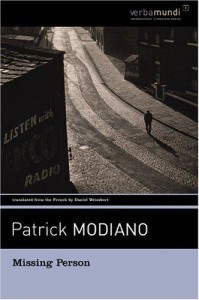 This post was contributed by Dr Akane Kawakami, Senior Lecturer in 20th and 21st-century French and francophone literature in Birkbeck’s Department of Cultures and Languages. It was originally published on The Washington Post. Dr Kawakami’s books include A Self-Conscious Art: Patrick Modiano’s Postmodern Fictions.
This post was contributed by Dr Akane Kawakami, Senior Lecturer in 20th and 21st-century French and francophone literature in Birkbeck’s Department of Cultures and Languages. It was originally published on The Washington Post. Dr Kawakami’s books include A Self-Conscious Art: Patrick Modiano’s Postmodern Fictions.
Patrick Modiano, winner of this year’s Nobel Prize in literature, is a paradox. He writes bestsellers but shuns the media. His novels sound autobiographical, yet his declared subject is a historical period that ended just before he was born. His style is clear and simple, but it masks complex time frames, unreal scenarios and a narrator who often seems to know little about the story he is in charge of. He is a household name in France but almost unknown outside his own country. This is one reason why the recipient of this year’s literature prize may come as something of a surprise to the world at large, if not to his faithful and numerous Francophone readers.
Even for those of us who have been reading and loving his books for several decades, this honor establishing him as a “grand man of letters” seems somehow not to fit the media-shy author. Can it really be that this recluse — famously inarticulate on the French literary program “Apostrophes” and always reluctant to give interviews — has been dragged into the limelight to be given the greatest literary accolade of all?
Modiano himself has always played down his own achievements, as well as the status of his chosen medium, the novel. In 1975, after four successful novels, Modiano — in a rare interview — claimed that the novel was an “anachronistic” genre that had ”slipped away” from public view. His heroes are known for slipping away, too; they’re shadowy, furtive figures modeled on himself (they tend to be tall, dark, shy and not good at interviews). In storylines that are reminiscent of classic detective novels, his heroes set off on their searches into the past, trying to solve mysteries rooted in the period of the Occupation, Modiano’s avowed obsession.
 The Occupation of France by the Nazis during World War II — along with the collaboration of many French nationals and the murder of French Jews — is a dirty pocket of French history that was not much discussed following the Allied victory. After Charles de Gaulle inaugurated the Fifth Republic, the general tendency was to stop talking about les années noires. It was only authors of a later generation — such as Modiano, whose guilt was inherited rather than personal — who proved able to explore this painful period. His first novel, about an anti-Semitic Jew who leads a colorful and surreal existence during the war, was published in 1968. Missing Person, published in 1978, is another highlight, about an amnesiac detective who goes on a hunt for his own identity during the Occupation. Honeymoon (1990), the story of a young Jewish woman who disappears in 1942, is also a gripping read.
The Occupation of France by the Nazis during World War II — along with the collaboration of many French nationals and the murder of French Jews — is a dirty pocket of French history that was not much discussed following the Allied victory. After Charles de Gaulle inaugurated the Fifth Republic, the general tendency was to stop talking about les années noires. It was only authors of a later generation — such as Modiano, whose guilt was inherited rather than personal — who proved able to explore this painful period. His first novel, about an anti-Semitic Jew who leads a colorful and surreal existence during the war, was published in 1968. Missing Person, published in 1978, is another highlight, about an amnesiac detective who goes on a hunt for his own identity during the Occupation. Honeymoon (1990), the story of a young Jewish woman who disappears in 1942, is also a gripping read.
Modiano’s novels are usually built around several time frames. They might start off in the 1980s, go back to the 1960s to evoke his youth and then suddenly shelve down into the 1940s to reveal a crucial link between a friend of his deceased parents and the woman he is dating in the present. Or the link will not be crucial; it will simply be a case of what might have been, the possibility that one ephemeral life that was extinguished during the Occupation might have brushed past another who has happened to survive.
In Dora Bruder (1997), Modiano gave up fiction and tried to re-create the real life of the heroine of Honeymoon, relating the few facts he had recovered about her movements in 1941 to his own wanderings through the Parisian streets as an adolescent in the 1960s, and to his walks in the 1990s. Gaps in his knowledge evoke the poignancy of the subject, as, in the end, Modiano has to concede that he still knows almost nothing about the girl, except that she was eventually arrested by the Gestapo and ended her days in Auschwitz.
Modiano tells all this in a limpid, almost classical prose that belies the ugliness of the events and facts. His writing is extremely readable, which is perhaps the reason for both his popularity in France and his relative lack of academic recognition (his novels are taught more in English-speaking universities than in French ones). Yet his clear writing eases the reader through instances of formal experimentation that would not be out of place in a Paul Auster novel: bewildering shifts in time, multiple appearances of “Patrick,” who may or may not be the author, and apparently real settings transformed into strange, hallucinatory spaces.
Light is something Modiano is good at describing, and many of the scenes in his novels are almost cinematic in their visual impact. Modiano co-wrote the screenplay of Lacombe, Lucien (1974), directed by Louis Malle, and has carried on to make more films, such as The Son of Gascogne (Pascal Aubier, 1995) and Bon Voyage (Jean-Paul Rappeneau, 2003).
His prose also achieves a difficult feat, which is to get French readers to face, time and time again, the unspeakable acts of betrayal and cowardice perpetuated during the Occupation. The detective novel framework, the clear style, the diffident narrators — all this makes it deceptively simple for readers to occupy the narrator’s seat in Modiano’s novels. The narrator of Missing Person introduces himself saying, “I am nothing. Nothing but a pale shape, silhouetted that evening against the cafe terrace.”
The joy of reading a Modiano novel is to slip into that silhouette, to make the journey through the decades of French history and then — sometimes, suddenly — experience all the horror of the past at the same time as the immunity conferred by its distance.
